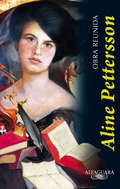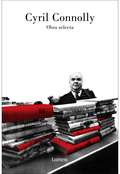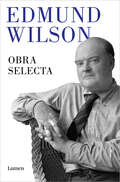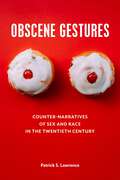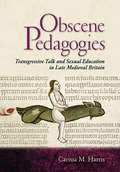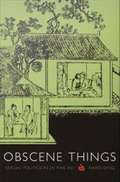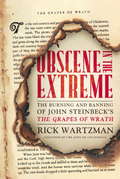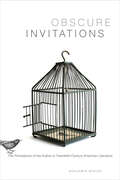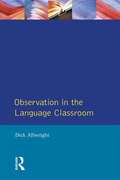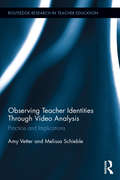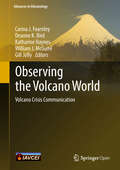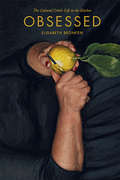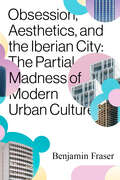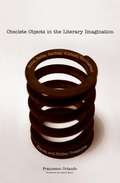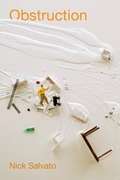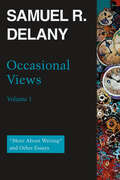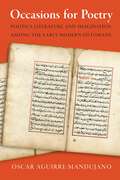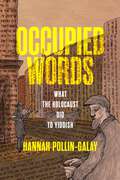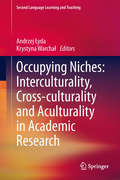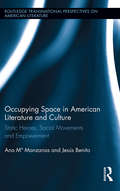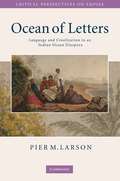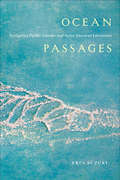- Table View
- List View
Obra reunida
by Aline PetterssonUna incursión en los parajes de la conciencia En el contexto de la literatura latinoamericana, Aline Pettersson es una de las primeras escritoras contemporáneas que se han interesado en un tema poco popular: la soledad de la mujer soltera, y la condición femenina; el amor, la noción del tiempo, lo cotidiano y la creciente violencia de fin de siglo. Este volumen integra sus libros Más allá de la mirada (cuentos), De cuerpo entero (autobiografía), Viajes paralelos (reflexiones) y las novelas Casi en silencio, Círculos, Sombra de ella misma, Los colores ocultos y La noche de las hormigas.
Obra selecta
by Cyril ConnollyReunido en un solo volumen la práctica totalidad de la obra de Connolly, uno de los grandes ensayistas ingleses del siglo XX. Cyril Connolly está considerado unánimemente uno de los grandes ensayistas ingleses del siglo XX, uno de los hombres de letras con mayor capacidad para seducir al público con su vasta erudición, su buen gusto, su ingenio y su sentido del humor. En el presente volumen, sin precedentes en nuestro país, se reúne la práctica totalidad de la obra de Connolly. Además de sus dos libros de culto, Enemigos de la promesa y La tumba inquieta, títulos inclasificables, a caballo entre la crítica y la autobiografía, se ofrece también una serie de textos hasta ahora inéditos en castellano. En primer lugar, Los diplomáticos desaparecidos, un opúsculo sobre la fuga en 1951 de Guy Burgess y Donald Maclean, altos funcionarios de los servicios secretos que formaron el núcleo de los llamados espías de Cambridge a favor de la URSS. Y finalmente una amplia selección de sus mejores artículos, piezas de variada índole donde tan pronto nos habla de Auden, Eliot, Joyce o Pound como de la novela policíaca, el oficio de crítico, Barcelona durante la guerra civil, la bibliofilia, Grecia, Londres o James Bond. La crítica ha dicho:«Sus más explosivos momentos literarios.»Karl Krispin, Zenda «Por favor, busquen a Connolly. Su lectura es un reactivo infalible.»Gabi Martínez, Qué Leer «Definitivamente, Connolly no es arqueología, sino literatura.»Nora Catelli, Babelia, El País
Obra selecta
by Edmund WilsonLos mejores ensayos y cartas del crítico estadounidense más influyente del siglo XX, «inteligente e implacable, un prosista de altura» (El País) 50.º ANIVERSARIO «En estas páginas excelentemente seleccionadas y prologadas por Aurelio Major se descubrirá a un Edmund Wilson que analiza y juzga. Pone énfasis y refuta. [...] No alcanzarían las páginas de este suplemento para comentar este extraordinario texto.»Ernesto Ayala-Dip, Babelia Edmund Wilson fue el crítico estadounidense más influyente del siglo XX. Su curiosidad omnívora y su ambición lo convirtieron también en historiador, reportero de investigación, novelista y cronista, y sus ensayos y reseñas siguen resultando apasionantes porque los sustenta el enérgico placer que le suscitaba enfrentarse a un nuevo libro, escritor o tema. Wilson fue el crítico de la generación perdida, formada por escritores como Hemingway, Dos Passos o Scott Fitzgerald, así como uno de los primeros en vincular entre sí la trascendental obra de Joyce, Proust, Eliot o Stein, y en reivindicar los méritos de autoras como Wharton o Porter. En el quincuagésimo aniversario de su muerte, Lumen presenta esta edición con un nuevo prólogo de Aurelio Major, que recoge y ordena una muestra sustancial de la vasta producción de Wilson y que puede considerarse la mejor antología de su obra crítica en cualquier idioma. Alternadas con ensayos y reseñas, se incorporan también crónicas y algunas de sus cartas más importantes, como las que se cruzó durante décadas con Vladimir Nabokov. El insobornable criterio de Wilson, su perspicacia, el independiente ejercicio de su responsabilidad son, hoy como ayer, una fiesta de la inteligencia y un antídoto contra la conformidad, las convenciones y la uniformidad totalizadora. La crítica ha dicho:«Fue, junto a Cyril Connolly, el gran crítico literario periodístico del pasado siglo [...]. Increíbles su imaginación y talento para leer y detectar puntadas en el tejido, pero aun así, es sobre todo un lector de sentimientos, [...] de las metamorfosis del alma y de los cuerpos.»Alejandro Gándara, El Mundo «Wilson fue, además de un crítico inteligente e implacable, un prosista de altura dotado de enormes recursos dialécticos y suasorios: la antología de Major refleja perfectamente esos envidiables atributos.»Manuel Rodríguez Rivero, El País «Escribo sólo para Edmund Wilson.»Ernest Hemingway «Edmund Wilson pervive como crítico por su infinita vitalidad y su intenso amor por la literatura.»Harold Bloom «Wilson, sólo después de Sainte-Beuve, ha sido el crítico más influyente de esa historia moderna que se caracteriza, entre otras cosas, por sus viejos críticos literarios.»Christopher Domínguez Michael, Letras Libres «Lo relevante de Wilson es la actitud: cosmopolita, apasionado, curioso, erudito, dialogante, atento a tendencias políticas y filosóficas.»Letra Internacional «Wilson dio a la crítica norteamericana algo que no había tenido: una figura analítica, de curiosidad universal.»Juan Malpartida, ABC
Obscene Gestures: Counter-Narratives of Sex and Race in the Twentieth Century
by Patrick S. LawrenceDrawing on sources as diverse as Supreme Court decisions, nightclub comedy, congressional records, and cultural theory, Obscene Gestures explores the many contradictory vectors of twentieth-century moralist controversies surrounding literary and artistic works from Henry Miller’s Tropic of Cancer to those of Toni Morrison, Alice Walker, Kathy Acker, Robert Mapplethorpe, 2 Live Crew, Tony Kushner, and others. Patrick S. Lawrence dives into notorious obscenity debates to reconsider the divergent afterlives of artworks that were challenged or banned over their taboo sexual content to reveal how these controversies affected their critical reception and commercial success in ways that were often determined at least in part by racial, gender, or sexual stereotypes and pernicious ethnographic reading practices.Starting with early postwar touchstone cases and continuing through the civil rights, feminist, and LGBTQ+ movements, Lawrence demonstrates on one level that breaking sexual taboos in literary and cultural works often comes with cultural cachet and increased sales. At the same time, these benefits are distributed unequally, leading to the persistence of exclusive hierarchies and inequalities.Obscene Gestures takes its bearings from recent studies of the role of obscenity in literary history and canon formation during the late nineteenth and early twentieth centuries, extending their insights into the postwar period when broad legal latitude for obscenity was established but when charges of obscenity still carried immense symbolic and political weight. Moreover, the rise of social justice movements around this time provides necessary context for understanding the application of legal precedents, changes in the publishing industry, and the diversification of the canon of American letters. Obscene Gestures, therefore, advances the study of obscenity to include recent developments in the understanding of race, gender, and sexuality while refining our understanding of late-twentieth-century American literature and political culture.
Obscene Pedagogies: Transgressive Talk and Sexual Education in Late Medieval Britain
by Carissa M. HarrisAs anyone who has read Chaucer’s Canterbury Tales knows, Middle English literature is rife with sexually explicit language and situations. Less canonical works can be even more brazen in describing illicit acts of sexual activity and sexual violence. Such scenes and language were not, however, included exclusively for titillation. In Obscene Pedagogies, Carissa M. Harris argues instead for obscenity’s usefulness in sexual education. She investigates the relationship between obscenity, gender, and pedagogy in Middle English and Middle Scots literary texts from 1300 to 1580 to show how sexually explicit and defiantly vulgar speech taught readers and listeners about sexual behavior and consent.Through innovative close readings of literary texts including erotic lyrics, single-woman’s songs, debate poems between men and women, Scottish insult poetry battles, and The Canterbury Tales, Harris demonstrates how through its transgressive charge and galvanizing shock value, obscenity taught audiences about gender, sex, pleasure, and power in ways both positive and harmful. She focuses in particular on understudied female-voiced lyrics and gendered debate poems, many of which have their origin in oral culture, and includes teaching-ready editions of fourteen largely unknown anonymous lyrics in women’s voices. Harris’s own voice, proudly witty and sharply polemical, inspires the reader to address these medieval texts with an eye on contemporary issues of gender, violence, and misogyny.
Obscene Things: Sexual Politics in Jin Ping Mei
by Naifei DingIn Obscene Things Naifei Ding intervenes in conventional readings of Jin Ping Mei, an early scandalous Chinese novel of sexuality and sexual culture. After first appearing around 1590, Jin Ping Mei was circulated among some of China's best known writers of the time and subsequently was published in three major recensions. A 1695 version by Zhang Zhupo became the most widely read and it is this text in particular on which Ding focuses. Challenging the preconceptions of earlier scholarship, she highlights the fundamental misogyny inherent in Jin Ping Mei and demonstrates how traditional biases--particularly masculine biases--continue to inform the concerns of modern criticism and sexual politics. The story of a seductive bondmaid-concubine, sexual opportunism, domestic intrigue, adultery and death, Jin Ping Mei has often been critiqued based on the coherence of the text itself. Concentrating instead on the processes of reading and on the social meaning of this novel, Ding looks at the various ways the tale has been received since its first dissemination, particularly by critiquing the interpretations offered by seventeenth-century Ming literati and by twentieth-century scholars. Confronting the gender politics of this "pornographic" text, she troubles the boundaries between premodern and modern readings by engaging residual and emergent Chinese gender and hierarchic ideologies.
Obscene in the Extreme: The Burning and Banning of John Steinbeck's The Grapes of Wrath
by Rick WartzmanFew books have caused as big a stir as John SteinbeckOCOs "The Grapes of Wrath," when it was published in April 1939. By May, it was the nationOCOs No. 1 bestseller, flying off store shelves at a rate of 10,000 copies a week. But in Kern County, California?the JoadsOCO newfound home?the book was burned publicly and banned from library shelves. "Obscene in the Extreme" tells the remarkable story behind that fit of censorship, a moment when several lives collided as part of a larger class struggle roiling the nation. It is a superb historical narrative that serves as an engaging window into an extraordinary time of upheaval in America, when as Steinbeck put it, ?A revolution is going on. OCO
Obscure Invitations: The Persistence of the Author in Twentieth-Century American Literature
by Benjamin WidissLiterary studies in the postwar era have consistently barred attributing specific intentions to authors based on textual evidence or ascribing textual presences to the authors themselves. Obscure Invitations argues that this taboo has blinded us to fundamental elements of twentieth-century literature. Widiss focuses on the particularly self-conscious constructions of authorship that characterize modernist and postmodernist writing, elaborating the narrative strategies they demand and the reading practices they yield. He reveals that apparent manifestations of "the death of the author" and of the "free play" of language are performances that ultimately affirm authorial control of text and reader. The book significantly revises received understandings of central texts by Faulkner, Stein, and Nabokov. It then discusses Eggers' Heartbreaking Work of Staggering Genius and the films Seven and The Usual Suspects, demonstrating that each is a highly self-aware rebuttal of the notion of authorial absence.
Observation in the Language Classroom (Applied Linguistics and Language Study)
by Dick AllwrightThis book provides an account of classroom observation in a historical and educational perspective. Drawing on extracts from classic studies in this field, Dick Allwright reviews the development of research and experiment since the 1970's. The book thus not only provides a background to recent research, but also identifies areas for future development. Stress is laid on the link to be made between practice and research and it is argued that policy-making. either at classroom or institutional level, is heavily dependent on descriptive accounts of classroom reality.
Observing Teacher Identities through Video Analysis: Practice and Implications (Routledge Research in Teacher Education)
by Amy Vetter Melissa SchiebleTeaching is often seen as an identity process, with teachers constructing and enacting their identities through daily interactions with students, parents and colleagues. This volume explores how conducting video analysis helps teachers gain valuable perspectives on their own identities and improve classroom practice over time. This form of interactional awareness fosters reflection and action on creating classroom conditions that encourage equitable learning. The volume follows preservice English teachers as they examine video records of their practice during student teaching, and how the evidence impacts their development as literacy teachers of diverse adolescents. By applying an analytic framework to video analysis, the authors demonstrate how novice teachers use positioning theory to transform their own identity performance in the classroom. Education scholars, teachers and professional developers will greatly benefit from this unique perspective on teacher identity work.
Observing the Volcano World: Volcano Crisis Communication (Advances in Volcanology)
by Carina J. Fearnley Deanne K. Bird Katharine Haynes William J. McGuire Gill JollyThis open access book provides a comprehensive overview of volcanic crisis research, the goal being to establish ways of successfully applying volcanology in practice and to identify areas that need to be addressed for future progress. It shows how volcano crises are managed in practice, and helps to establish best practices. Consequently the book brings together authors from all over the globe who work with volcanoes, ranging from observatory volcanologists, disaster practitioners and government officials to NGO-based and government practitioners to address three key aspects of volcanic crises. First, the book explores the unique nature of volcanic hazards, which makes them a particularly challenging threat to forecast and manage, due in part to their varying spatial and temporal characteristics. Second, it presents lessons learned on how to best manage volcanic events based on a number of crises that have shaped our understanding of volcanic hazards and crises management. Third, it discusses the diverse and wide-ranging aspects of communication involved in crises, which merge old practices and new technologies to accommodate an increasingly challenging and globalised world. The information and insights presented here are essential to tapping established knowledge, moving towards more robust volcanic crises management, and understanding how the volcanic world is perceived from a range of standpoints and contexts around the globe.
Obsessed: The Cultural Critic’s Life in the Kitchen
by Elisabeth BronfenEven the most brilliant minds have to eat. And for some scholars, food preparation is more than just a chore; it’s a passion. In this unique culinary memoir and cookbook, renowned cultural critic Elisabeth Bronfen tells of her lifelong love affair with cooking and demonstrates what she has learned about creating delicious home meals. She recounts her cherished food memories, from meals eaten at the family table in postwar Germany to dinner parties with friends. Yet, in a thoughtful reflection on the pleasures of cooking for one, she also reveals that some of her favorite meals have been consumed alone. Though it contains more than 250 mouth-watering recipes, Obsessed is anything but a conventional cookbook. As she shares a lifetime of knowledge acquired in the kitchen, Bronfen hopes to empower both novice and experienced home chefs to improvise, giving them hints on how to tweak her recipes to their own tastes. And unlike cookbooks that assume readers have access to an unlimited pantry, this book is grounded in reality, offering practical advice about food storage and reusing leftovers. As Bronfen serves up her personal stories and her culinary wisdom, reading Obsessed is like sitting down to a home-cooked meal with a clever friend.
Obsession, Aesthetics, and the Iberian City: The Partial Madness of Modern Urban Culture
by Benjamin FraserAlthough many depictions of the city in prose, poetry, and visual art can be found dating from earlier periods in human history, Obsession, Aesthetics, and the Iberian City emphasizes a particular phase in urban development. This is the quintessentially modern city that comes into being in the nineteenth century. In social terms, this nineteenth-century city is the product of a specialist class of planners engaged in what urban theorist Henri Lefebvre has called the bourgeois science of modern urbanism. One thinks first of the large scale and the wide boulevards of Baron Georges von Haussmann&’s Paris or the geometrical planning vision of Ildefons Cerdà&’s Barcelona. The modern science of urban design famously inaugurates a new way of thinking the city; urban modernity is now defined by the triumph of exchange value over use value, and the lived city is eclipsed by the planned city as it is envisioned by capitalists, builders, and speculators. Thus urban plans, architecture, literary prose and poetry, documentary cinema and fiction film, and comics art serve as windows into our modern obsession with urban aesthetics. This book investigates the social relationships implied in our urban modernity by concentrating on four cities that are in broad strokes representative of the cultural and linguistic heterogeneity of the Iberian peninsula. Each chapter introduces but moves well beyond an identifiable urban area in a given city, noting the cultural obsession implicit in its reconstruction as well as the role of obsession in its artistic representation of the urban environment. These areas are Barcelona&’s Eixample district, Madrid&’s Linear City, Lisbon&’s central Baixa area, and Bilbao&’s Seven Streets, or Zazpikaleak. The theme of obsession—which as explored is synonymous with the concept of partial madness—provides a point of departure for understanding the interconnection of both urbanistic and artistic discourses.
Obsolete Objects in the Literary Imagination: Ruins, Relics, Rarities, Rubbish, Uninhabited Places, and Hidden Treasures
by Francesco Orlando Gabriel Pihas Daniel SeidelTranslated here into English for the first time is a monumental work of literary history and criticism comparable in scope and achievement to Eric Auerbach's Mimesis. Italian critic Francesco Orlando explores Western literature's obsession with outmoded and nonfunctional objects (ruins, obsolete machinery, broken things, trash, etc. ). Combining the insights of psychoanalysis and literary-political history, Orlando traces this obsession to a turning point in history, at the end of eighteenth-century industrialization, when the functional becomes the dominant value of Western culture. Roaming through every genre and much of the history of Western literature, the author identifies distinct categories into which obsolete images can be classified and provides myriad examples. The function of literature, he concludes, is to remind us of what we have lost and what we are losing as we rush toward the future.
Obstinate Hebrews: Representations of Jews in France, 1715-1815
by Ronald SchechterA path-breaking study of the Jews in France from the time of the philosophies through the Revolution and up to Napoleon. Examines how Jews were thought of during this time, by both French writers and the Jews themselves.
Obstruction
by Nick SalvatoCan a bout of laziness or a digressive spell actually open up paths to creativity and unexpected insights? In Obstruction Nick Salvato suggests that for those engaged in scholarly pursuits laziness, digressiveness, and related experiences can be paradoxically generative. Rather than being dismissed as hindrances, these obstructions are to be embraced, clung to, and reoriented. Analyzing an eclectic range of texts and figures, from the Greek Cynics and Denis Diderot to Dean Martin and the Web series Drunk History, Salvato finds value in five obstructions: embarrassment, laziness, slowness, cynicism, and digressiveness. Whether listening to Tori Amos's music as a way to think about embarrassment, linking the MTV series Daria to using cynicism to negotiate higher education's corporatized climate, or examining the affect of slowness in Kelly Reichardt's films, Salvato expands our conceptions of each obstruction and shows ways to transform them into useful provocations. With a unique, literary, and self-reflexive voice, Salvato demonstrates the importance of these debased obstructions and shows how they may support alternative modes of intellectual activity. In doing so, he impels us to rethink the very meanings of thinking, work, and value.
Occasional Views: "More About Writing and Other Essays"
by Samuel R. DelanyEssays, lectures, and interviews from the iconic, award-winning author and critic. Samuel R. Delany is an acclaimed writer of literary theory, queer literature, and fiction. His &“prismatic output is among the most significant, immense and innovative in American letters,&” wrote novelist Jordy Rosenberg in the New York Times in 2019. This anthology of essays, lectures, and interviews addresses topics such as 9/11, race, the garden of Eden, the interplay of life and writing, and notes on other writers such as Theodore Sturgeon, Hart Crane, Ursula K. Le Guin, Hölderlin, and an introduction to?and a conversation with—Octavia E. Butler. The first of two volumes, this book gathers more than thirty pieces on films, poetry, and science fiction. These sharp, focused writings by a bestselling Black and gay author are filled with keen insights and observations on culture, language, and life.&“An incredibly generous entry point to Samuel R. Delany&’s pioneering insights about the intersections of genre, race, sexuality, Science Fiction and what it means to live through and amongst those categories. As he states, &“What we need is not so much radical writers as we need radical readers!&” This collection helps us satisfy that deeply necessary and timely cultural need.&” —Louis Chude-Sokei, author of Floating In A Most Peculiar Way: A Memoir&“By turns gutsy and erudite, challenging and gracious, Delany&’s Occasional Views gives illuminating glances of his mind&’s life journey. How lucky we are to have these proofs of the resonant truths he has discovered along the way!&” —Nisi Shawl, author of Everfair&“Delany has such an intoxicating, prodigious, conversational mind, and More About Writing and Other Essays is a delicious journey into his brilliance. Whether he is unveiling how he navigates the terrain of being a science fiction writer; or introspective reflections on race, class, sexuality; or trusting his listeners as he gives wide ranging, honest answers in his interviews, responding with exacting humor to his critics, remembering Clarion teaching experiences, regretting missed sexual encounters with favorite writers, creating space for the complexity of holding love and questions in the same breath—we see how thoroughly he thinks about everything, and how vibrant and multitudinous the web of connections is in his memory and imagination. Reading Delany will make you a better writer. (I was particularly enthralled to read the dialogue with, and later introduction of, Octavia E. Butler right as she&’s finishing The Parable of the Talents!).&” —Adrienne Maree Brown, co-editor of Octavia&’s Brood
Occasions for Poetry: Politics, Literature, and Imagination Among the Early Modern Ottomans
by Oscar Aguirre-MandujanoHow Turkish poetry became the preferred mode for communicating, debating, and shaping political and social experience in the early Ottoman EmpireOccasions for Poetry is a history of how Turkish poetry became the preferred mode for communicating, debating, and shaping political and social experience in the early Ottoman Empire. After the conquest of Constantinople in 1453, Ottoman elites at the imperial court turned to poetry to craft distinctive modes of expression in order to articulate their own place within the Ottoman sultanate.Placing Ottoman court poetry in its social and historical context, Oscar Aguirre-Mandujano argues that poetry functioned as a political act. Aguirre-Mandujano examines the occasions that compelled the Ottomans to compose poetry, to present it to their superiors, to share it with their peers, and to spend considerable efforts and time to make poetry often and to make it well. He explores how scholars and bureaucrats interacted with each other through poetic imagery, revealing how literary language affected bureaucratic practice. Poetry was not only an artistic activity, but also a means to advance or save one’s own political or bureaucratic career.For the Ottoman elite, poetry was more than a creative activity or a flattering description of Ottoman power and expansion; it was a vehicle to shape and mold their social reality. The language and genres created and used by these early modern Ottomans would define both a literary tradition and the shape of imperial politics and power for almost six centuries, until the end of the empire in the twentieth century.
Occult Knowledge, Science, and Gender on the Shakespearean Stage
by Mary Floyd-WilsonBelief in spirits, demons and the occult was commonplace in the early modern period, as was the view that these forces could be used to manipulate nature and produce new knowledge. In this ground-breaking study, Mary Floyd-Wilson explores these beliefs in relation to women and scientific knowledge, arguing that the early modern English understood their emotions and behavior to be influenced by hidden sympathies and antipathies in the natural world. Focusing on Twelfth Night, Arden of Faversham, A Warning for Fair Women, All's Well That Ends Well, The Changeling and The Duchess of Malfi, she demonstrates how these plays stage questions about whether women have privileged access to nature's secrets and whether their bodies possess hidden occult qualities. Discussing the relationship between scientific discourse and the occult, she goes on to argue that as experiential evidence gained scientific ground, women's presumed intimacy with nature's secrets was either diminished or demonized.
Occupied Words: What the Holocaust Did to Yiddish (Jewish Culture and Contexts)
by Hannah Pollin-GalayHow Yiddish changed to express and memorialize the trauma of the HolocaustThe Holocaust radically altered the way many East European Jews spoke Yiddish. Finding prewar language incapable of describing the imprisonment, death, and dehumanization of the Shoah, prisoners added or reinvented thousands of Yiddish words and phrases to describe their new reality. These crass, witty, and sometimes beautiful Yiddish words – Khurbn Yiddish, or “Yiddish of the Holocaust” – puzzled and intrigued the East European Jews who were experiencing the metamorphosis of their own tongue in real time. Sensing that Khurbn Yiddish words harbored profound truths about what Jews endured during the Holocaust, some Yiddish speakers threw themselves into compiling dictionaries and glossaries to document and analyze these new words. Others incorporated Khurbn Yiddish into their poetry and prose. In Occupied Words, Hannah Pollin-Galay explores Khurbn Yiddish as a form of Holocaust memory and as a testament to the sensation of speech under genocidal conditions. Occupied Words investigates Khurbn Yiddish through the lenses of cultural history, philology, and literary interpretation. Analyzing fragments of language consciousness left behind from the camps and ghettos alongside the postwar journeys of three intellectuals—Nachman Blumental, Israel Kaplan and Elye Spivak—Pollin-Galay seeks to understand why people chose Yiddish lexicography as a means of witnessing the Holocaust. She then turns to the Khurbn Yiddish words themselves, focusing on terms related to theft, the German-Yiddish encounter and the erotic female body. Here, the author unearths new perspectives on how Jews experienced daily life under Nazi occupation, while raising questions about language and victimhood. Lastly, the book explores how writers turned ghetto and camp slang into art—highlighting the poetry and fiction of K. Tzetnik (Yehiel Di-Nur) and Chava Rosenfarb. Ultimately, Occupied Words speaks to broader debates about cultural genocide, asking how we might rethink the concept of genocide through the framework of language.
Occupying Niches: Interculturality, Cross-culturality and Aculturality in Academic Research
by Andrzej Łyda Krystyna WarchałThis book presents a collection of thematically focused articles addressing culture-specific features of academic communication, with a particular focus on communication conducted in English as an Additional Language and directed at multicultural audiences. It comprises papers arranged in four sections: Expert writers, Novice writers and readers, Conference participants, and Non-research academic genres. The book explicitly addresses and is centred upon the concept of a research niche understood as a space to be captured and populated, as a temporary location to move or grow out of in the course of individual professional development from novice to expert, and as a space to consciously reach beyond, delimited by one's linguistic, cultural, educational, and geopolitical background. Here the niche is approached as a frame of reference for discussion of what is culture-bound, culture-sensitive, and culture-free in the academic community and its practices.
Occupying Space in American Literature and Culture: Static Heroes, Social Movements and Empowerment (Routledge Transnational Perspectives on American Literature)
by Jesús Benito Sanchez Ana M. ManzanasOccupying Space in American Literature and Culture inscribes itself within the spatial turn that permeates the ways we look at literary and cultural productions. The volume seeks to clarify the connections between race, space, class, and identity as it concentrates on different occupations and disoccupations, enclosures and boundaries. Space is scaled up and down, from the body, the ground zero of spatiality, to the texturology of Manhattan; from the striated place of the office in Melville’s "Bartleby, the Scrivener" on Wall Street, to the striated spaces of internment camps and reservations; from the lowest of the low, the (human) clutter that lined the streets of Albany, NY, during the Depression, to the new Towers of Babel that punctuate the contemporary architecture of transparencies. As it strings together these spatial narratives, the volume reveals how, beyond the boundaries that characterize each space, every location has loose ends that are impossible to contain.
Ocean Of Letters: Language And Creolization In An Indian Ocean Diaspora (Critical Perspectives On Empire)
by Pier M. LarsonOcean of Letters is a remarkable history of imperialism, language, and creolization in the largest African diaspora of the Indian Ocean in the early modern period. Ranging from Madagascar to the Mascarenes, the Comores, and South Africa, Pier M. Larson sheds new light on the roles of slavery, emancipation, oceanic travel, Christian missions, and colonial linguistics in the making of Malagasy-language literacy in the islands of the western Indian Ocean. He shows how enslaved and free Malagasy together with certain European colonists and missionaries promoted the Malagasy language, literacy projects and letter writing in the multilingual colonial societies of the region between the seventeenth and mid-nineteenth centuries. Addressing current debates in the history of Africa and the African diaspora, slavery, abolition, creolization and the making of modern African literatures, the book crosses thematic as well as geo-imperial boundaries and brings fresh perspectives to Indian Ocean history.
Ocean Passages: Navigating Pacific Islander and Asian American Literatures (Critical Race, Indigeneity, and Relationality #6)
by Erin SuzukiIn her pathbreaking book, Ocean Passages, Erin Suzuki explores how movement through—and travel across—the ocean mediates the construction of Asian American and Indigenous Pacific subjectivities in the wake of the colonial conflicts that shaped the modern transpacific. Ocean Passages considers how Indigenous Pacific scholars have emphasized the importance of the ocean to Indigenous activism, art, and theories of globalization and how Asian American studies might engage in a deconstructive interrogation of race in conversation with this Indigenous-centered transnationalism. The ocean passages that Suzuki addresses include the U.S. occupation and militarization of ocean space; refugee passage and the history and experiences of peoples displaced from the Pacific Islands; migratory circuits and the labors required to cross the sea; and the different ways that oceans inform postcolonial and settler colonial nationalisms. She juxtaposes work by Indigenous Pacific and Asian American artists and authors including James George, Maxine Hong Kingston, Kathy Jetñil-Kijiner, lê thi diếm thúy, Ruth Ozeki, and Craig Santos Perez. In Ocean Passages, Suzuki explores what new ideas, alliances, and flashpoints might arise when comparing and contrasting Asian and Pacific Islander passages across a shared sea.
Ocean Passages: Navigating Pacific Islander and Asian American Literatures (Critical Race, Indigeneity, and Relationality #6)
by Erin SuzukiIn her pathbreaking book, Ocean Passages, Erin Suzuki explores how movement through—and travel across—the ocean mediates the construction of Asian American and Indigenous Pacific subjectivities in the wake of the colonial conflicts that shaped the modern transpacific. Ocean Passages considers how Indigenous Pacific scholars have emphasized the importance of the ocean to Indigenous activism, art, and theories of globalization and how Asian American studies might engage in a deconstructive interrogation of race in conversation with this Indigenous-centered transnationalism. The ocean passages that Suzuki addresses include the U.S. occupation and militarization of ocean space; refugee passage and the history and experiences of peoples displaced from the Pacific Islands; migratory circuits and the labors required to cross the sea; and the different ways that oceans inform postcolonial and settler colonial nationalisms. She juxtaposes work by Indigenous Pacific and Asian American artists and authors including James George, Maxine Hong Kingston, Kathy Jetñil-Kijiner, lê thi diếm thúy, Ruth Ozeki, and Craig Santos Perez. In Ocean Passages, Suzuki explores what new ideas, alliances, and flashpoints might arise when comparing and contrasting Asian and Pacific Islander passages across a shared sea.
